|
July, 2005
Aug. 2005
Sept. 2005
Oct. 2005
Nov. 2005
Dec. 2005
Jan. 2006
Feb. 2006
Mar. 2006
Apr. 2006
May 2006
June 2006
July 2006
August 2006
September 2006
October 2006
November 2006
December 2006
January 2007
February 2007
March 2007
April 2007
May 2007
June 2007
July 2007
August 2007
September 2007
October 2007
November 2007
December 2007
February 2008
March 2008
April 2008
May 2008
June 2008
July 2008
August 2008
September 2008
October 2008
November 2008
December 2008
February 2009
March 2009
April 2009
May 2009
July 2009
August 2009
September 2009
November 2009
December 2009
January 2010
February 2010
March 2010
April 2010
May 2010
June 2010
July 2010
September 2010
October 2010
November 2010
December 2010
January 2011
February 2011
March 2011
April 2011
May 2011
June 2011
July 2011
September 2011
October 2011
December 2011
February 2012
April 2012
June 2012
July 2012
August 2012
October 2012
November 2012
February 2013
May 2013
July 2013
August 2013
October 2013
November 2013
April 2014
July 2014
October 2014
March 2015
May 2015
September 2015
ČERVENÁ BARVA PRESS NEWSLETTER
Gloria Mindock, Editor Issue No. 91 October, 2015
INDEX
October Newsletter, 2015
Hi everyone-
What a busy September! October will be the same!
October 1st, we officially released "Becoming an Ancestor" by Lucille Lang Day
and "Trailerville" (a play) by John Dufresne.
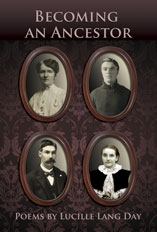
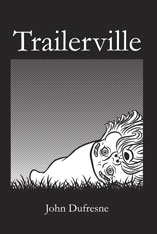
Order Becoming an Ancestor by Lucille Lang Day
Order Trailerville (a play) by John Dufresne
On Friday, October 9th, "Trailerville" opens at the Worcester County Light Opera Company
WCLOC at the Grandview Playhouse
21 Grandview Ave.
Worcester, MA 01603
Tickets: $20.00
Fridays, Saturdays, October 9, 2015 - October 18, 2015
8:00 PM-10:00 PM
Hope that some of you will come see this play. Copies of the play "Trailerville" will be sold at the
theatre during the performances. You can also buy it at:
The Lost bookshelf http://www.thelostbookshelf.com/index.html#Trailerville
and it is available at Small Press Distribution
http://www.spdbooks.org/Producte/9780996689427/trailerville.aspx
So far in 2015, we have published 11 full-lengths and 2 chapbooks. We have many more books to
get out this year. Please be patient. I am finalizing many books which will be out in
October and November.
I would like to welcome Daniel Y. Harris as the interviewer for Cervena Barva Press.
Bill and I are excited to have him be a part of the press. Daniels first interview will
be with Lenore Myka. That interview will be posted in the November newsletter.
We have 3 interviews this month in the newsletter. Hope you enjoy them!
This month I started Read America Read.
READ AMERICA READ! Taking the idea from Chicago (800 books are being left on the L for people to take), on Oct. 10th, please take a book and leave it on the train, coffee shop, bench etc… for others to pick up. You can leave one anywhere. I'm calling this Read America Read.
Please pass this on. Everyone in every city, please do this. In small towns, find a place and leave a book. Lets get America reading again. Lets get our books out there. Hope you will do this and please let me know how it goes. I will write an article about it. So mark October 10th!!! Put a post it note in the book that says: Book is courtesy and part of Read America Read. Provided for by your press name or your first name only if you are not a publisher.
Read America Read events will take place on a regular basis. If you are a publisher and are going to do this, let me know. I will give you publicity. It will show that publishers are involved in this too.
This will be turned into an organization by me. Our next event will be in November.
I will be working on a webpage, so the next event can just have a web address in it.
I have gotten a great response to this and I am so grateful. Be sure to let me know if you take part in
this and take a photo of your book in its spot and e-mail it to me.
Thanks a zillion!
Cervena Barva Press Reading Series
Thursday, October 22nd, 7PM
Arts in the Armory/Cervena Barva Press Studio, Basement B8
191 Highland Avenue
Somerville, MA
Readers: Lucille Lang Day,
Richard Michael Levine and Adnan Onart
Admission is $3.00. Refreshments Served
Lucille Lang Day has published nine previous poetry collections and chapbooks, including
The Curvature of Blue, Wild One, and Infinities. Her first poetry collection, Self-Portrait with Hand Microscope,
received the Joseph Henry Jackson Award, and her latest chapbook, Dreaming of Sunflowers: Museum Poems,
won the 2014 Blue Light Poetry Prize. Day is also the author of a children's book, Chain Letter, and a memoir,
Married at Fourteen: A True Story, which received a PEN Oakland Josephine Miles Literary Award and was a
finalist for the Northern California Book Award in Creative Nonfiction. Her poems, short stories, and essays
have appeared widely in magazines and anthologies. The founder and director of a small press, Scarlet Tanager Books,
she holds an MFA in creative writing from San Francisco State University
and a PhD in science/mathematics education from UC Berkeley.
Website: http://lucillelangday.com/
Richard Michael Levine has written magazine articles for many national publications, including Harper's,
Atlantic Monthly, Rolling Stone, New York, The New York Times Magazine and Esquire, where he was a
contributing editor and wrote a monthly column on the media for a number of years. He has been a staff
writer and editor at Newsweek and The Saturday Review, received an Alicia Patterson fellowship, and
has taught at the University of California at Berkeley Graduate School of Journalism. His bestselling
non-fiction book, Bad Blood: A Family Murder in Marin County, was published by Random House and the
Penguin Group and has been translated into several languages. His poetry has been widely published in
literary magazines and anthologies and collected in Catch and Other Poems. His short story collection,
The Man Who Gave Away His Organs: Love and Obsession at Midlife, will be released on July 10, 2015,
by Capra Press. http://richardmichaellevine.com/
Adnan Adam Onart lives in Boston, MA. His work appeared in Prairie Schooner, Colere Magazine,
Red Wheel Barrow, The Massachusetts Review, among others. His first poetry collection,
The Passport You Asked For, has been published by The Aeolos Press, together with Kenneth
Rosen's Cyprus' Bad Period. He earned the honorable mention of
the 2007 New England Poetry Club Erikan Mumford Award. He is one of the winners of
2011 Nazim Hikmet Poetry Competition.
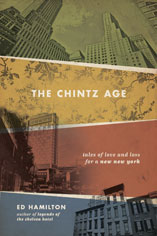
Cervena Barva Press Book Launch
Friday, October 30th, 7PM
Cervena Barva Press Studio, Basement, B8
Come celebrate the publication of "The Chintz Age" by Ed Hamilton
Arts at the Armory
191 Highland Avenue
Somerville, MA
Refreshments served.
Ed Hamilton is the author of Legends of the Chelsea Hotel: Living with the Atists and Outlaws of
New York's Rebel Mecca (Da Capo, 2007). His fiction has appeared in dozens of small journals, including
Limestone, The Journal of Kentucky Studies, SoMa Literary Review, Exquisite Corpse, Bohemia, Omphalos,
and in translation in the Czech Republic's Host. His non-fiction has appeared in The Villager,
Chelsea Now, The Huffington Post, and Living With Legends: Hotel Chelsea Blog. Ed lives in New York City.
Visit his website ar www.edhamilton.nyc
Just as Soylent Green is people, so The Chintz Age is now. Everything is cheaper and chintzier than in
the past, from consumer products to culture itself. Our great cities, and, in particular, New York, are
being transformed as we speak, as rising rents squeeze out the artists and bohemians who honed and
burnished the city's glittering cutting edge. So should we look backward in teary-eyed nostalgia for
the glorious past, or grit our teeth and move forward, accepting the inevitability of change in order
to carve out a place for ourselves in this Brave New New York? This book of gritty urban fairy tales
represents a heartfelt prayer for the future of the arts in New York, as well as a blueprint for a moral
and spiritual resistance to the forces of cultural philistinism.
In seven stories and a novella, Ed Hamilton takes on this clash of cultures between the old and the new,
as his characters are forced to confront their own obsolescence in the face of this rapidly surging
capitalist juggernaut. Ranging over the whole panorama of New York neighborhoods—from the East Village
to Hell's Kitchen, and from the Bowery to Washington Heights—Hamilton weaves a spellbinding web of
urban mythology. Punks, hippies, beatniks, squatters, junkies, derelicts, and anarchists--the entire
pantheon of urban demigods—gambol through a grungy subterranean Elysium of dive bars, cheap diners,
flophouses, and shooting galleries, searching for meaning and a place to make their stand.
PRAISE FOR THE LEGENDS OF THE CHELSEA HOTEL
There's something remakable about the way the author manages to celebrate the Chelsea's singular
atmosphere — the exuberant aspiring artists, the divorced movie stars, the disheveled blonde who may
have Tourette's and who lingers in the lobby hissing like a snake — without ever forgetting how toxic
the air is for many of the people who come desperate to breathe it.
—Jeff Giles, The New York Times Book Review
Here is a link to a recent interview/article about The Chintz Age that was published in Boston Magazine on 10/02/15:
http://www.bostonmagazine.com/news/blog/2015/10/02/gentriwatch-gentrification-book-somerville/
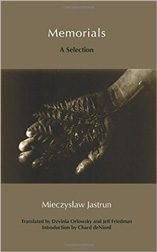
Congratulations to my dear friend Dzvinia Orlowsky and to Jeff Friedman who won an NEA Translation Fellowship
for their translation of Mieczyslaw Jastrun's Memorials. I highly recommend this book. I am so excited for them!
"There is great sorrow in these later poems of the remarkable Polish poet and translator, Mieczyslaw Jastrun,
whose great mastery of form and metaphysical thought are apparent throughout. The beauty of these spare lines
and images both surprise and deepen the mystery of his complete engagement with experience: "Chrysanthemums,
purple/ with anger, almost disappeared in shadow," "the cup extinguishes the drinker,"
"Ancient deaths/linger/in vineyard branches./Are these not stony gorges?/Is nature dead?/Don't
eat the bread/and the water isn't for drinking." Experience for Jastrun was a matter of faith
as well as intimate revelation, not to mention survival. These are truly extraordinary poems.
Hats off to their translators, who have somehow managed to bring forth both his "cold fire"
and "tree of sorrow/ rooted deep in my heart."
-Philip Schultz
Memorials A Selection by Mieczyslaw Jastrun
Translated by Dzvinia Orlowsky and Jeff Friedman
Introduction by Chard deNiord
ISBN 978-1-935084-60-0
110 pages: $16.00
August, 2014
To order: http://www.lavenderink.org/content/diag/294
Area Spotlight
Robin Stratton is editor and publisher of Big Table Publishing,
Boston Literary Magazine, and Mockingbird Square.
In 2015, Robin opened The Newton Writing and Publishing Center.

"The Newton Writing and Publishing Center provides guidance, inspiration, encouragement, and all the tools
you need to revise your work to perfection, whether it's a novel, a poem, a short story, your memoirs, or a
non-fiction project. Writing groups, classes and workshops led by published authors and instructors promote
the disciplined approach you need to reach your goal. Our affiliation with Big Table Publishing Company means
you receive special consideration if you are seeking publication of your full-length manuscript, and if you've
got some poems or short fiction looking for a home, check us out at Boston Literary Magazine!"
The Newton Writing and Publishing Center is a gorgeous space. When you walk in, you are surrounded by amazing
antiques. In the center, you can take intense workshops, attend lively open mics, attend special literary
events, readings, award ceremonies, and book launches.
It is located at 289 Elliot St., Newton Upper Falls, MA
For more information:
Website: www.newtonwritingandpublishingcenter.com
Blog is http://newtonwriting.blogspot.com/

BREAKABLE THINGS Poems by Loren Kleinman
Reviewed by Pui Ying Wong
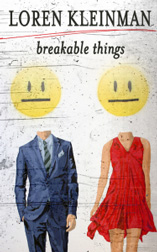
In Loren Kleinman's memorable book of poems "Breakable Things" it's not only objects, but people who are breakable.
They break and inflict pain on each other and are themselves broken. To cope they turn to drinks for substance,
seemingly in a state of haze and drunkenness. In one poem the speaker recalls when a lover throws a hot kettle
at her:
Water pours off the table,
down on the floor,
and the world sleeps
in a bowl of macaroni.
Air, I want air.
Breathe, breathe.
Kleinman narrates the drama and others like this in clear and spare language; her voice is self-aware and
restrained. I am drawn in by the outward drama but also by the inner emotional life of the poems. The
distance between the speaker and the subject allows me to experience a terrifying scene, for example,
these lines in "Mother Falls from the Sky" seem to float above the situation:
She dives head first,
beak spearheaded
into the grassy floor.
Each bone rattles
like a mariachi band
shaking the last maraca…
Kleinman writes with compassion towards her characters, their fear and confusion, their volatility and
fragility, their love and devotion. I recognize these characters because they are a lot like us.
In one poem a friend was getting drunk and slumped "like a Buddha in a parka", the speaker responded by
picking up the bottle, "bring it to my lips/and suck venom." Is it disgust? Pity? Love? In a date poem,
the oysters seem more alive than the people eating them. In another, the heart is not a box but empty
like a wind-swept parking lot. Kleinman is not interested in assigning roles like victim or perpetrator,
but faithful to the ambiguity of human experience as she tells of this childhood episode:
His wet tongue showered me
and fingered out the child.
He cut me
and bruised my wrists
with soft breath…
…I didn't care to love another.
Yet these are also poems about moving on and coming to terms with the past, and the search for
authentic self. And in all of life's turbulences there are moments that astonish, in tenderness and
gratitude. Kleinman tells after a nomadic night, the couple watched the sun inside the Honda.
… from the bottom of New Jersey.
We watched the sun,
a big light bulb
over the windshield.
It made us squint.
A few poems can use compression as in "He breaks me like a glass plate", lines like "he breaks he
breaks he breaks me…", "to step to step to step on me…" feel flat and do not have the impact like
"I wish I was the moon tonight." in the same poem. And in "After you cheat on me the light is still on",
the rant sacrifices the poetic lines. But these are small complaints, in this book of poems.
Kleinman succeeds in giving us a moving work of human frailties and survival. In closing,
here is the ending of what seems like a trajectory in the poem "Ordinary Things":
…You drive through
and look up
at the flock of symmetrical birds
flying overhead,
back at the sign that says
next rest stop 60 miles,
back at the curve
of the steering wheel,
at your hands,
and the road ahead,
wondering how
you got here after all.

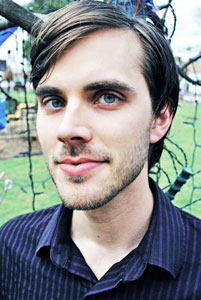
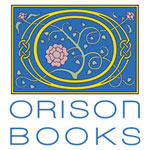
What made you decide to start Orison books?
I've been an editor at literary magazines for many years, and I've always enjoyed the curatorial and
editorial processes, and I find it thrilling to give a platform to literary work that really excites me.
A natural extension of this, in my mind, was to start a literary press in order to champion work I believe
in and give it a potentially more enduring form than a page in a literary magazine-a book, which might be
treasured and returned to for years and years. For whatever reason, we don't tend to keep literary
magazines and return to them again and again the way we do single-author books or edited anthologies.
I can't say why this is, but I've observed that it is generally true.
In considering what form the press would take, I was influenced by my longstanding interest in literature
that unabashedly engages the most profound and ultimately mysterious questions we humans have been asking
all along. This includes literature that comes out of religious and spiritual traditions as well as literature
that is engaged with metaphysical concerns or experiences of transcendence and sublimity from non-affiliated
perspectives. I wasn't aware of any press that intentionally focused on this sort of literature, and it
seemed to me a huge gap to be filled. I want Orison Books to occupy the expansive space of the human spirit,
which is neither ideological nor closed off to the possibility of the divine.
If all literature is supposed to be "spiritual" how do you intend to set Orison books apart?
I don't believe that all literature is "supposed to be 'spiritual.'" Who said that? I certainly didn't!
In fact, I think a huge portion of the literature written in this country today intentionally avoids
anything that might smack of spirituality. It is often avoided like an infectious disease, viewed with
suspicion or scorn, and guarded against with a flimsy shield of easy irony. It's often that, or the
opposite-an ideological, religious approach to literature from a perspective that is too narrow and
rigid to appeal to a wide audience.
My hope is that Orison Books might play a part in demonstrating the ongoing necessity, vitality, and cultural
significance of spiritually engaged literature that does not seek to represent a rigid ideology, but rather
is devoted to exploring the mysteries of our existence and experience, a literature that is at home with the
unknown and the metaphysical imagination.
I think our forthcoming titles exemplify the breadth and depth of Orison Books' vision:
- Requiem for Used Ignition Cap by J. Scott Brownlee, recipient of the 2015 Orison Poetry Prize.
As Yusef Komunyakaa writes, "Brownlee juxtaposes mind and spirit, and there's nowhere these poems
don't dare to go."
- The Divine Magnet: Herman Melville's Letters to Nathaniel Hawthorne, edited by scholar Mark Niemeyer,
with a foreword by Pulitzer Prize-winning novelist Paul Harding.
- Constellarium, the debut poetry collection by Jordan Rice, which chronicles the author's gender
transition and engages the ontological quandaries that arise from this experience, reckoning with
family history and religious heritage along the way.
- The Orison Anthology, a new annual collection of the finest spiritually-engaged writing that
appeared in periodicals during the previous year.
What are some major road bumps that you have faced so far?
Funding is an ongoing difficulty. We've had a lot of support from generous donors who are interested
in our mission, but, as you know, publishing books is expensive, and it's very difficult to start a
non-profit press without a large amount of capital. We are a volunteer-run 501(c)(3) non-profit,
entirely a labor of love; none of the editorial staff members are paid. We're currently conducting a
fundraising effort through Indiegogo (similar to Kickstarter). I encourage anyone interested in
supporting Orison Books to visit http://igg.me/at/orisonbooks.
What can you tell me about your first publication, I Scrape the Window of Nothingness by Stella Radulescu?
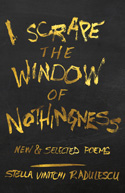
When we were planning our inaugural title, Stella's work came immediately to mind. I've long been a great
admirer of her surreal, fragmentary, almost mystical poetry, which I think is a perfect fit for Orison Books'
focus on the life of the spirit from an expansive and open perspective. There are moments in Stella's
work that are purely transcendent and unlike anything you'll find elsewhere in American poetry.
I've worked on translations of Stella's French poetry for years (an ongoing project). She writes poetry
in three languages-Romanian, French, and English-but does not translate any of her own work between the
languages. I Scrape the Window of Nothingness is a new and selected volume of her original English-language
work, spanning several decades. I believe that Stella's work is greatly underappreciated in this country,
and I hope that I Scrape the Window of Nothingness helps bring more recognition to her absolutely unique
poetic voice. The book can be purchased at www.orisonbooks.com/shop.

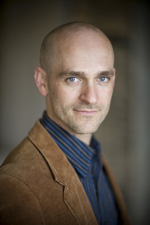
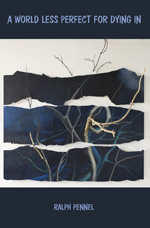
The "world" referred to in the title of A World Less Perfect for Dying In has been described as an
"imperfect but beautiful place where we live and die" by Minnesota Poet Laureate Joyce Sutphen, and
as "a world haunted by beauty and despair" by Jim Moore, author of Invisible Strings. Both of those
descriptions suggest that the world is a two sided place, one that is beautiful, but also asphyxiating
and scary. Is this an accurate description in your opinion? If so, what particular poem in the work in
your opinion best encompasses such a description?
That is a good question. And, the answer is yes and no. I think looking at the world, or anything
as a simple binary system is fairly limiting. To see the world as, or to position oneself behind a
worldview that is strictly binary in nature and outcome is also particularly dangerous. I think Moore's assertion,
that the world revealed in the poems in this collection is "haunted by beauty" as an aspect of "despair," or
aspiration to spirit, which may feel counterintuitive, lends itself to a more comprehensive picture of my own
worldview. Because I often am haunted by what I love, to the point of "despair." I think all the poems have a way
of getting at these concerns, but if I had to pick I would say perhaps "Confiding in the Prison Guard," "Shooster,"
and even "Just off the Hennepin Bridge" are good representatives of these concerns.
I read a few of your short stories online ("Embracing Vast and Improbable" on germmagazine.com, and
"Something Like Forgiveness" on your blog), both of which seem to accurately reflect the notion that the world
has both beautiful and negative aspects. Are any of the topics/issues/inspirations in A World Less Perfect for Dying
echoed from previous works? Did any of your previous works serve as a base or framework for A World Less Perfect for Dying?
I would take that even further and say that beauty is relevation of self from the negative, that neither is an
experientially individuated aspect from the other.
Yes, absolutely. I would definitely say that the themes and tenants of A World Less Perfect for Dying In are present in
pervious works, even the works you mentioned (though it might be more accurate to say they all evolved simultaneously
and not sequentially). I think writers are constantly revisiting the same themes, always writing the same story,
the same poem, regardless of whether they are willing to admit it or not. It's definitely one of the reasons why I
write in more than one genre and even take liberties with traditional genre defining constraints. There are just
ideas that need expression that poetry may not be able to provide but other forms can. Or I may need to work through
an idea in multiple forms before I feel like I've wrapped my heart around it fully.
The second piece you mentioned is actually nonfiction. Which is a whole other beast. I don't often work in
nonfiction, but because I might still be too close to the subject to write about it effectively in poetry or fiction
I will turn to nonfiction as the form of conveyance. If I consciously take the subject on as nonfiction, I can seat
myself at the necessary distance from the subject at the onset to gain the correct emotional distance and perspective.
What is your favorite topic/idea to write about and why?
That is a tough one. I think maybe there are two things that rise to the top. One is the relationship between
memory and identity, which is a theme I'm working through in the new manuscript I've begun. I really became
engrossed in this idea when I began actively to try to reconcile my grandmother's death from Alzheimer's in combination
with ways I was thinking about self and consciousness. Religion/spirituality finds it way to the top, too
(and in many ways isn't necessarily a separate concern than the aforementioned). Most of the time I'm not
consciously aware of it. But, it has certainly played a part in the way I confront the task of how a poem
ought to elevate from the page.
Do you prefer writing poetry or prose? Why? Do you think there certain themes/issues to write about that are
better suited for either form? Which form do you think is more effective in conveying a message in general?
I like them equally, to be perfectly honest. Prose allows me to do things that poetry does not, take ideas,
images further. I don't know that there are necessarily themes exclusive to poetry or prose. Sometimes the
solution to a concern I have expresses itself to me initially in a way that's too big for poetry so I pursue
it in prose. Or maybe I'm too close to something emotionally to pursue it through poetry yet, so I'll take it
on through prose. Or, sometimes, I just want to write a story.
How has your writing evolved throughout your career?
I take fewer and more risks, both. I take different risks than I used to, but I think I'm taking better risks.
I think I care more about the risks I take. It's a slower process, but a necessary one. For instance, I used to
write more "love" poems, but that was because love was a risk when I was younger. And, of course, they weren't
really about loving an "other" but were about accepting a "self." I'm more centered so I am less indebted to
defining the inaccessible, the ineffable in this way through this lens.
What is your favorite work that you have written? That someone else has written?
Honestly, concerning individual pieces, I don't know if I can answer this. But, I will say that my favorite
projects have been the assembling of A World Less Perfect for Dying In and the novel that I need to go back
and revise. The novel actually keeps tugging at me, so I may need to dust it off and devote some new energy
to it. They are two very different processes, though I did find that the way the characters revealed themselves
to me while working on the novel was a bit like the way that a poem reveals itself to me when I'm really working
in an unconscious space. I liked quite a bit that, that was true. It definitely made writing long form fiction
feel more like home.
Where do you find/how do you cultivate ideas and inspiration?
What drives you to be a writer?
Anything can push or inspire me to write. But I pay close attention to the things I can't let go of,
the things I "obsess" over, the things that burn a little longer after ingestion. This is not uncommon for writers
in general, though some may work from a less conscious forward process and may only acknowledge the connections after
moving on from particular projects. Which isn't wrong. Ideas, incidents that pertain to identity, aspects of the
self carry particular resonance with me.
I've been connected to the arts in some capacity in my life since I can remember. I drew every day as a child, have
always sought creative outlets, been drawn to creative communities. Writing is one way to engage in the creative
process that I find particularly satisfying, as is photography, which I take nearly as much pleasure in. I also
really enjoy puzzles, so arranging language to generate ways of experiencing meaning is particularly interesting
to me.
Order A World Less Perfect for Dying In here...

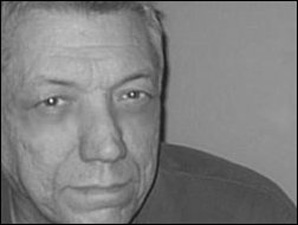
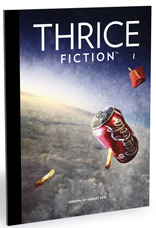
RW Spryszak was born in Chicago in 1953. His first works of poetry and fiction were seen in various publications of
Chicago's "Underground Press," including The Seed, which published him — and others — under assumed names.
He was a member of Marjorie Peters' Southside Creative Writers Workshop and attended Columbia College of Chicago
in the early 70's.
Writing was set aside for the larger priority of raising a family, but by the mid-80's he began to appear in
various publications of the pre-internet "altzine" world such as Paper Radio, Asylum,
The Lost and Found Times and many others.
In the early 90's he took over the reins of the SP Stressman's Seattle-based Fiction Review and
brought it to Chicago. The Fiction Review only managed three issues from March of 1991 until late
summer 1992, but included the work of many writers who were already established in the "alternative"
scene or became notable for their later accomplishments and extensive publishing resumes.
The Fiction Review featured writers such as Thomas Wiloch, Richard Kostelanetz, Paulette Roeske,
Hugh Fox, Gorman Berchard, William P. Haynes (Elliot), Sheila Murphy, Jack Foley, Lorri Jackson,
Jake Berry, Rupert Wondolowski, Willie Smith, B. Z. Niditch, and many others. A few of the
few remaining copies of The Fiction Review can be found at the Read/Write Library, in Chicago.
Some of his work can still be found in the John M. Bennett Publications Collections at
The Ohio State University Libraries, (formerly, the Avant Writing Collection).
In late 2010, along with Dave Simmer, he founded Thrice Fiction magazine which began
publishing in 2011, for which he is currently fiction editor.
How has your job as an editor affected your own writing?
Horribly. Sometimes I think people who get rejected must think I'm impossible. But if they saw how hard I am
when it comes to my own stuff, I know they would feel that I handled them with kid gloves, so to speak. I think
I'm okay with something and then realize I've been sending a piece around with an "of" where an obvious "if"
should be that's been there through three rewrites unfixed. Or I look at a paragraph and think "well that would
be just ducky IF the reader knew what I was thinking, which the reader doesn't because the idea referenced an
obscure notion I never communicated." I'm so much more forgiving of glitches in other people's work and a terror
when it comes to my own Sometimes I go happily into the submission pile because I'm convinced everything I've ever
done sucks and I need to see some good writing for a change. I've been working on something for years that has gone
through more rewrites than I've flipped calendars and there are moments I'm convinced it's the most boring piece of
tripe ever invented. I guess it's one thing to be able to say "no, do it THIS way." But then I look at my own work
and become convinced I'm the one doing it all wrong.
The thing I keep trying for in my own work is this impossible goal, probably. All I want, in my own work,
is for the reader to forget they are r-e-a-d-i-n-g. I forgive this miscue in other people's work because it's
a goal they may not share - if that makes any sense - though I'd prefer to see material in which I get to page
six before I even realize I'm in a story. That's usually a good sign. But when I try to do it sometimes it
gets all bogged down. I am ten times harder on myself than I am with anyone else. That's hard for a writer who
has just been rejected to understand, but I'm afraid it's the honest truth. I wish they could see it.
In your opinion, what makes a literary piece successful? Have these standards changed over the years?
I honestly don't know the evolution of this over the years. I'm not that smart or intuitive. It's also
probably too subjective. I think maybe I touched on it a little in the first question. If I get half way
through a story before I realize where I am I think that's a good clue. And yet if I've pulled away from
the piece and say to myself "wow, I've just read ten pages and didn't know it sucked me that far in," does
that mean I just hit a weak spot in the story that woke me out of the spell, and therefore did the piece just
then go sour? You see what a trap that is? Plus if you're talking about a genre, there are certain things that
will work and certain things that won't. Put what doesn't work in that genre into the piece and it is no longer
"successful." A lot of writers don't like the idea of thinking about your audience. They seem to want to have their
work be a kind of edifice one has to scale, true only to itself in its own universe. That's okay, but if it's as
boring as sin who is going to sit around and plow through it without they're being the kind of artless person
who says "everyone says this is good, so it must be my fault I'm yawning." No. I believe writing is still
performance. That may be something I learned when I was an actor, but I think keeping your reader's interest
seems axiomatic.
And in going through submissions for Thrice, it must be said, I can't think about other people's standards.
I have to think about Thrice's standards.
How do you think the rise of technology has affected the literary field?
Zadie Smith summed it up better than anyone. "Work on a computer that is disconnected from the internet." End of answer.
What do you look for in a submission?
To be perfectly frank I have to be interested in what you have going on, and this has to happen to me
quickly. If I turn the page still looking for a reason to like what I've got you've caught me in a
gracious moment but you're probably not going to like my answer. That said, the truth is that I return
more work because it isn't in Thrice's wheelhouse than because it's a "bad" piece. I see a lot of
material that would work well in other places but simply doesn't fit with what we've got going.
Thrice goes on two tracks, I hope. One track has a bit of "kink" in the rail. It's rather oddball,
so to speak. I hate the word "experimental" because I'd rather you figure out the formula on your
own time before sending the thesis. So I guess we can use the word "alternative" instead. Anyway the
second track is simply damn good writing. Usually more traditional but undeniable. This combination
has made a few readers wonder what we think we're all about, but we've said this is how we're going
to operate from Day One.
That's the long answer. The short answer is - grab me from the first line and don't let go.
How do you handle those who do not take rejection so well?
Thanks to the lovely internet where a writer can fire off an email the minute he gets something turned
down, I have seen my share of emotion and reaction. 99% of the time I ignore the response, delete it,
and even forget the name of the butthurt party - so they may feel they'll never have a chance with us
again but they'd be wrong because I don't have a list of these names. But if the whining and egoism and
righteous indignation is really juicy and stupid I devolve into my 4chan persona and just tickle the
shit out of the asshole. We have a lovely series of emails then. And I do have a list of those names.
Oh hell yes I do.
You once wrote that you were glad to receive some of your rejection slips. How has rejection made you more successful?
I am thankful beyond words that some of the stuff I've submitted over the years was returned to me because,
looking at them now after the passage of time, to have had to live them down if they ever saw the light of
day would be twenty times harder than the rejection. People have to trust that a lot of editors really do
know shit when they see it. And I am thankful they didn't let me slide. If you stop and think about all the
things we consider "great works" now that had a difficult time getting seen (Catch-22, I'm told, got its name
because it was rejected 21 times previous), and really consider what that could mean, you should get to the
point where you realize there are only two answers to why it was rejected. And, as an editor, I've come to
this understanding with even more surety. It either just sucks, or it hasn't been sent to the right place.
I think writers forget the second one. They shouldn't.
On the other hand I don't think I have ever, in my life, felt so 100% about anything I've written that I
ever became livid or insulted that it was sent back. Too large an ego will kill the process, my friend.
Wake up here. Stop looking for conspiracies. Stop looking for evil motivations in others. Or just stop
being a jerk. You get something back, maybe try and see why. I don't know.
What is your advice for aspiring writers?
It is no mystery. You can't write a masterpiece unless you write something. Quit trying to be a writer
and just write, for Christ's sake.
Links: http://rwspryszak.com/author.htm
http://www.thricefiction.com/about.html


If you would like to be added to my monthly e-mail newsletter, which gives information on readings,
book signings, contests, workshops, and other related topics...
To subscribe to the newsletter send an email to:
newsletter@cervenabarvapress.com
with "newsletter" or "subscribe" in the subject line.
To unsubscribe from the newsletter send an email to:
unsubscribenewsletter@cervenabarvapress.com
with "unsubscribe" in the subject line.

Index |
Bookstore |
Our Staff |
Image Gallery |
Submissions |
Newsletter |
Readings |
Interviews |
Book Reviews |
Workshops |
Fundraising |
Contact |
Links
Copyright © 2005-2014 ČERVENÁ BARVA PRESS - All
Rights Reserved
|

